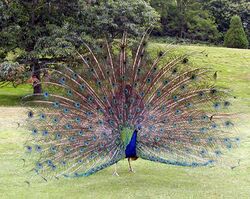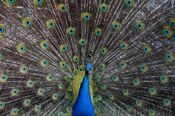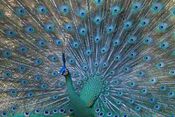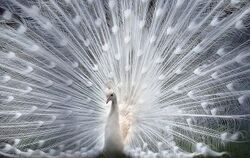Biology:Pavo (bird)
From HandWiki
Short description: Genus of birds
| Pavo Temporal range: Late Miocene to present
| |
|---|---|

| |
| Indian peacock (Pavo cristatus) displaying | |
| Scientific classification | |
| Domain: | Eukaryota |
| Kingdom: | Animalia |
| Phylum: | Chordata |
| Class: | Aves |
| Order: | Galliformes |
| Family: | Phasianidae |
| Tribe: | Pavonini |
| Genus: | Pavo Linnaeus, 1758 |
| Type species | |
| Pavo cristatus (Indian peafowl) Linnaeus, 1758
| |
| Species | |
| |
Pavo is a genus of two species in the pheasant family. The two species, along with the Congo peafowl, are known as peafowl.
Taxonomy
The genus Pavo was introduced in 1758 by the Swedish naturalist Carl Linnaeus in the tenth edition of his Systema Naturae.[1] The genus name is the Latin word for a peacock.[2] The type species is the Indian peafowl (Pavo cristatus).[3]
Species
The genus contains two species.[4]
| Male | Female | Name | Common name | Distribution |
|---|---|---|---|---|
 |
 |
Pavo cristatus | Indian peafowl | South Asia; introduced elsewhere |
 |
 |
Pavo muticus | Green peafowl | Southeast Asia |
Fossil record
- Pavo bravardi (Bravard's peafowl) (Early – Late Pliocene) – Gallus moldovicus, sometimes misspelt moldavicus, may be a junior synonym[5]
- Gallus aesculapii, a Late Miocene – Early Pliocene "junglefowl" of Greece, may also have been a peafowl[5]
In the Pliocene on the Balkan Peninsula, Bravard's peafowl coexisted with ptarmigans (Lagopus sp.)[6] Peafowl were widespread on the Balkan Peninsula and in Southeastern Europe until the end of the Pliocene.[7]
References
- ↑ Linnaeus, Carl (1758) (in Latin). Systema Naturae per regna tria naturae, secundum classes, ordines, genera, species, cum characteribus, differentiis, synonymis, locis. 1 (10th ed.). Holmiae (Stockholm): Laurentii Salvii. p. 156. https://www.biodiversitylibrary.org/page/727063.
- ↑ Jobling, James A. (2010). The Helm Dictionary of Scientific Bird Names. London: Christopher Helm. p. 294. ISBN 978-1-4081-2501-4.
- ↑ Peters, James Lee, ed (1934). Check-List of Birds of the World. 2. Cambridge, Massachusetts: Harvard University Press. p. 133. https://www.biodiversitylibrary.org/page/14482946.
- ↑ Gill, Frank; Donsker, David; Rasmussen, Pamela, eds (July 2021). "Pheasants, partridges, francolins". IOC World Bird List Version 11.2. International Ornithologists' Union. https://www.worldbirdnames.org/new/bow/pheasants/. Retrieved 23 August 2021.
- ↑ 5.0 5.1 Mourer-Chauviré, Cécile (1989). "A peafowl from the Pliocene of Perpignan, France". Palaeontology 32 (2): 439. https://www.palass.org/sites/default/files/media/publications/palaeontology/volume_32/vol32_part2_pp439-446.pdf.
- ↑ Boev, Zlatorar (1998). "Peafowls (g. Pavo Linnaeus, 1758) and Ptarmigans (g. Lagopus Brisson, 1760): an [sic] unique coexistance in North Bulgaria over 3 m. y. ago". - Biogeographia, Nuova Serie, Siena, 19 – 1997: 219-222. doi:10.21426/B6110058
- ↑ Boev, Z. 2002. Fossil record and disappearance of peafowl (Pavo Linnaeus) from the Balkan Peninsula and Europe (Aves: Phasianidae). – Historia naturalis bulgarica, 14: 109-115.
External links
Wikidata ☰ Q3917160 entry
 |


